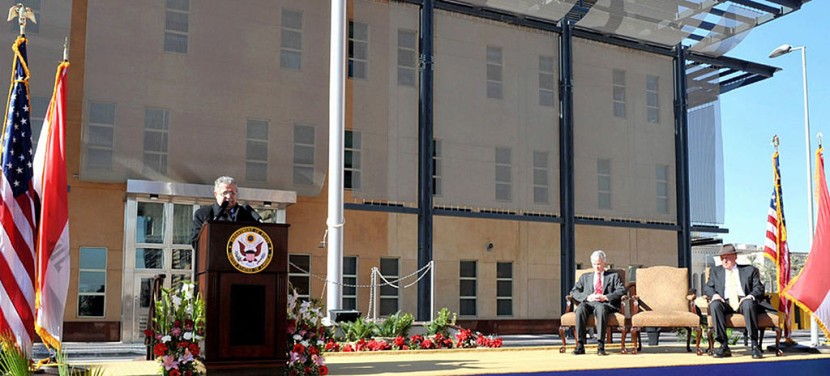
A month before the anniversary of the United States' assassination of a top Iranian general, fears were sparked as a volley of rockets targeted the U.S. Embassy in the heavily fortified Green Zone of Baghdad, according to the military of Iraq.
Based on the Iraqi military's statement on Sunday, the incident was orchestrated by an outlawed group, which launched eight rockets that targeted the Green Zone.
It resulted in the injury of Iraqi security personnel assigned at the checkpoint and damaged some cars and the residential complex, which fortunately is empty most of the time.
According to the U.S. Embassy statement, the C-ram defense system used to destroy missiles in midair was activated and deflected the attack.
The Embassy added that there was minor damage in the compound. They also confirmed that the rockets targetted the International Zone, which was why the Embassy's defensive system was engaged.
The statement also mentioned that they were able to contact all Iraqi political and government leaders to take steps and prevent such attacks and hold accountable those who were responsible for the attack.
Based on some reporters situated on the other side of the Tigris river, the defense system's thundering sound could be heard in the distance.
The U.S. installed the C-RAM system in the middle of the year because of the armed groups' attacks with their rockets targeting the Embassy and its premises, Reuters reported.
Earlier this month, the U.S. withdrew some staff from its Embassy in Baghdad as they temporarily reduced personnel before the first anniversary of the U.S. airstrike that killed Iran's top general, Qassem Soleimani, outside the airport of Baghdad on January 3.
A number of U.S. officials shared that the reduction in the number of staff stemmed from the concerns regarding the possible retaliatory attack.
The death of Soleimani sparked outrage and led the parliament of Iraq to pass a non-binding resolution days after, and called for the expulsion of all foreign troops from Iraq.
According to Aljazeera, the U.S. plans to reduce the number of troops from 3,000 to 2,500 who visit Iraq by mid-January before Trump is set to leave the office.
However, the frequency of the rocket attacks in Iraq has frustrated the administration of Trump.
Iran-backed militia groups have been blamed for orchestrating the attacks, which includes the Kataib Hezbollah group.
The said groups had agreed on an indefinite truce in October. However, the attack on Sunday is the third apparent violation.
The first incident happened on November 17, wherein a rocket slammed the U.S. Embassy and parts of Iraq's capital, killing a young woman.
The second attempt happened on December 10 when two convoys transporting logistical equipment for the U.S.-led coalition, which helps the Iraqi troops fight armed groups, were targeted with roadside bombs.
Washington warned Iraq in September that they will close the Embassy in Baghdad if the Iraqi government fails to take decisive action to end the rocket incidents and other attacks by the Iranian-backed militias on the American and allied interests in the country, NPR reported.
Related Article: Trump Signs 2-Day Spending Bill to Prevent Government Shutdown, Stimulus Bill on Negotiations
© 2026 HNGN, All rights reserved. Do not reproduce without permission.








